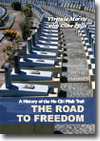| Our Publications | ||
| Books by Title | ||
| Books by Author | ||
| Books by Country | ||
| E-books | ||
| About | ||
| Orchid Press E-books | ||
| Distributed E-books | ||
| Our Bookshop | ||
| About Us | ||
| Browse Shop | ||
| How to Buy | ||
| Contact Us | ||
| WE BUY BOOKS AND LIBRARIES | ||
|
||
Book Reviews

A History of the Ho Chi Minh Trail
The Road to Freedom
byVirginia Morris
withClive Hills
2006. 196 pp., 107 colour, 24 b & w illustrations, 11 maps, index, 245 x 175, Hardcover
ISBN-10: 974-524-076-1 $29.95
ISBN-13: 978-974-524-076-6
Book review by Phillip Taylor MBE
(The Barrister)
This is an exciting travel book for military historians and a useful addition to the history of a turbulent time during the Vietnamese War and the construction of the Ho Chi Minh Trail.
Local councillor, Virginia Morris, and her husband Clive, are frequent visitors to South East Asia, having walked the Trail. They have a detailed local knowledge of what they have photographed and written about.
Actor Hugh Grant once said in the film ‘Notting Hill’, about Turkey, when he was trying to sell a travel book: ‘it helps, as the author has actually been there’! Presumably that inspired Julia Roberts to buy the book on Turkey even if it was being sold by Hugh Grant! The same sentiment applies with ‘The Road to Freedom’ which is authoritative, full of knowledge and detail, and yet sensitive to the intricate and virtually impossible sets of circumstances which have faced the people of South East Asia over the last fifty years.
The Trail
I lived through the awful times described and remember them well. My cousin was killed during that war, as a serviceman, so I have a particular interest in what Morris and Hills have to say so many years after the events occurred. I have also served with many US personnel who fought in Vietnam.
The Ho Chi Minh Trail was a decisive factor in the defeat of US forces in the Vietnam War. At its peak, over 16 years, the Trail ran through North and South Vietnam, Laos and Cambodia. Despite massive bombing, American efforts failed to prevent essential goods reaching the North Vietnamese Army. What is so important about the book is the attention it pays to detailed research, the places photographed and visited, and the people interviewed. In its historic perspective, the book is an illuminating statement of the human cost of the war.
Morris and Hills were the first Westerners to traverse the entire length of the Trail. They have produced a balanced and fascinating account of what is a most remarkable feat of engineering and tactical warfare during the War. Morris describes the Trail “as one of North Vietnam’s greatest military achievements”. She recalls an interview with General Giap, who oversaw the construction of the Trail, by saying whilst they were “at opposite ends of the political spectrum” she looked forward to shaking hands with him because he was “the man who had the vision and intellect to see its construction through to the fall of Saigon.” Indeed, it was a tremendous human achievement which won the war.
It is always difficult to view ‘achievements’ such as the Trail without consideration of the human cost involved. 120,000 people worked on the Trail with over 20,000 dead and 30,000 seriously injured by chemical sprays and unexploded bombs. The problem for Westerners is that we really do not understand South East Asia. The Trail, like the Burma railway, was built on death and human misery but this was a logistics exercise to end all logistic exercises.
Pham Tien Duat wrote a war poem about Xieng Phan in 1963 which concludes on the immensity of the project:
“The sound of the slow drawing from water pipes,
The great sounds of trucks heading along the road,
“In the battle zone,
The sound of bombing seems so small!”
A short review such as this cannot do justice to this scholarly and original work which is a worthy addition to the military historian’s library, giving a fair and balanced account of a remarkable feat of engineering and tactical warfare mixed, as it is, with all the excitement of a travel book and haunted by the ghosts of those who created Ho Chi Minh’s Trail.
[Read a review from the Journal of the Siam Society] [Read a review from The NYMAS REVIEW] [Read praise for this book from prominent sources] [Read the foreword by Gen. Sir John Reith] [More Orchid Press Reviews]
PO Box 70, Trinity TB, NL, A0C 2S0, Canada
Telephone: +1 709-330-4703